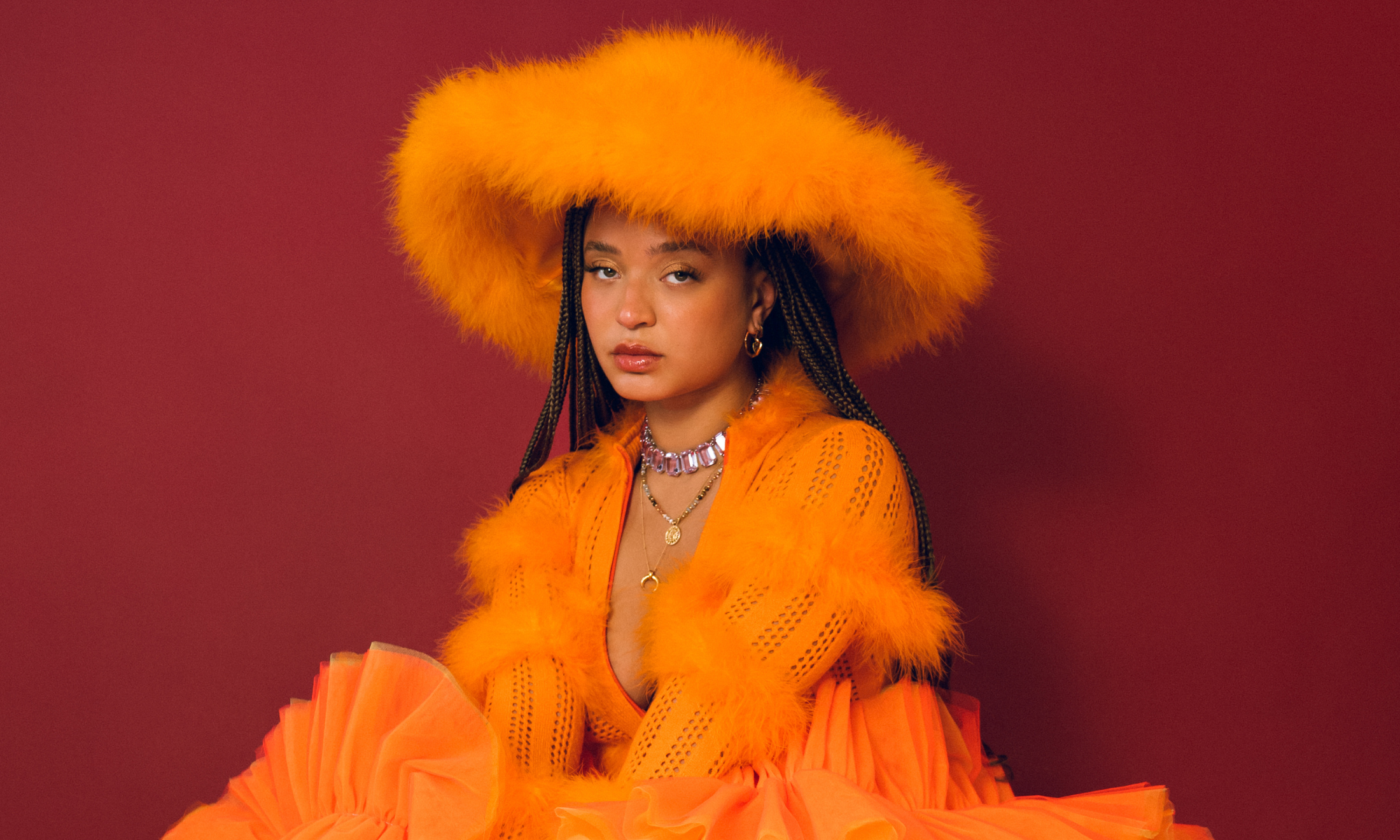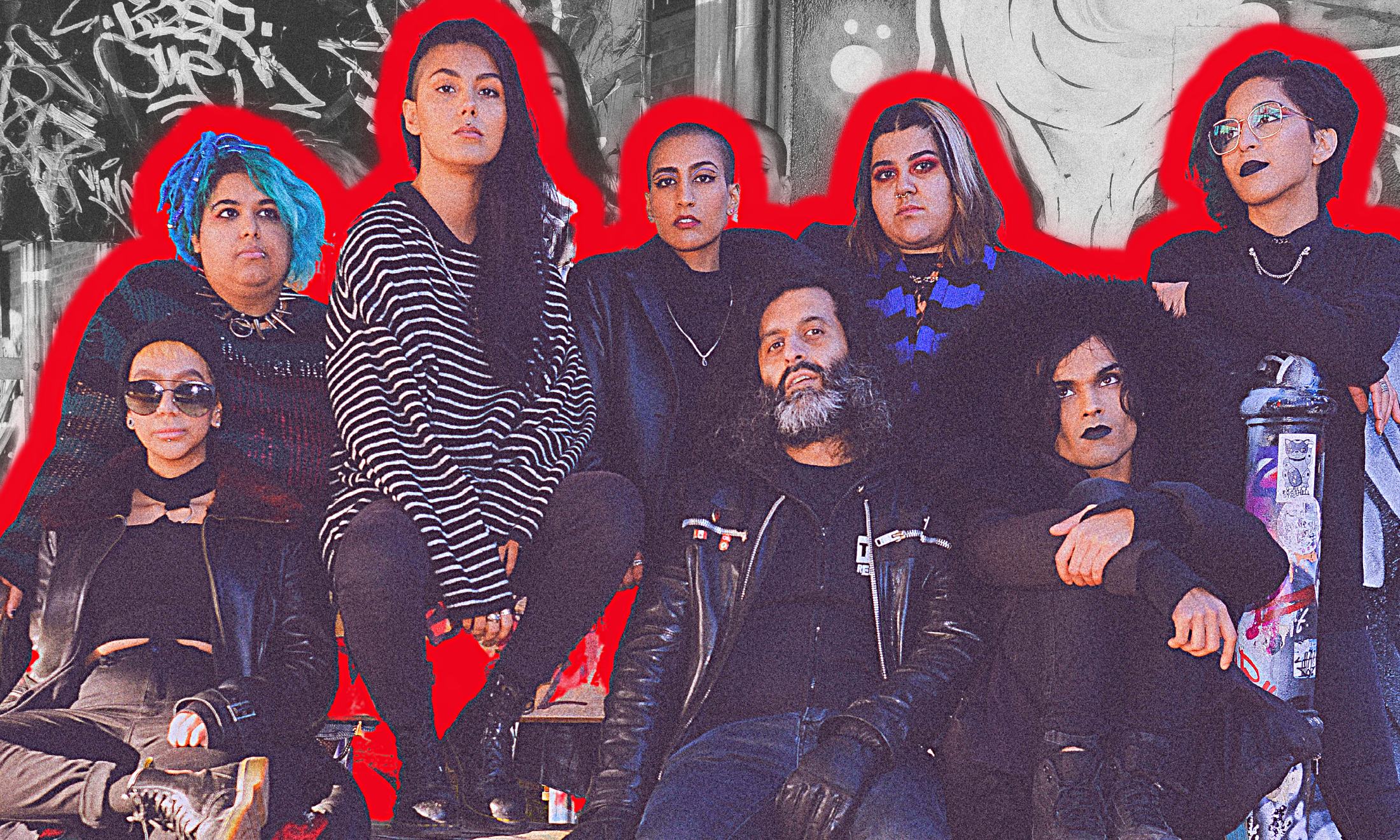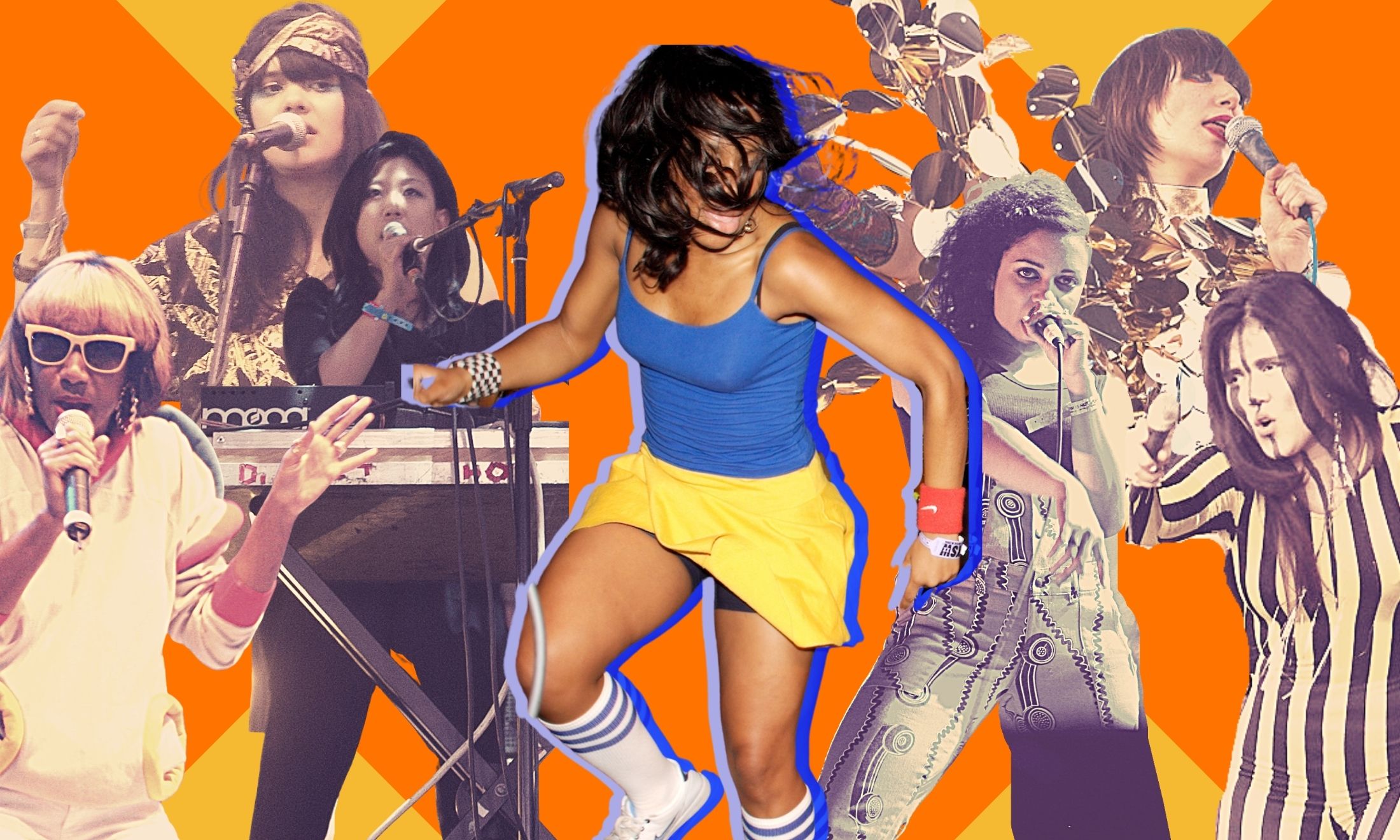Meet the musicians changing the face of who ‘should’ play the guitar
The roots of guitar playing lie with women of colour and queer people of colour, but they’ve too often been glossed over.
Naomi Larsson Piñeda
20 Mar 2023

Clockwise from bottom left: Big Joanie by Jamie MacMillan, Big Joanie Live by Jamie MacMillan, Nova Twins by Federica Burelli, Lava La Rue by @Blackksocks, Big Joanie Live by Jamie MacMillan, Lava La Rue by @Blackksocks
A grainy black and white clip on YouTube sees a woman in a long overcoat stroll along a railway platform in south Manchester. There’s a small band beside her, a crowd sitting on the opposite side of the tracks. She picks up a guitar and begins to shred. It is unmistakably the sound of Sister Rosetta Tharpe, a Black queer gospel singer and guitarist from Arkansas.
Sister Rosetta emerged in the 1930s, daring to mix gospel with secular music. Along with her unique guitar style, she laid the foundations for rock and roll. She was selling out arenas while navigating life in racist, segregated America – even having to sleep in a tour bus because she couldn’t stay in the hotels of the towns she played in.
Sister Rosetta later toured Europe with Muddy Waters, which is how she came to perform at a Manchester train station in 1964. Her time in the UK helped put her on the radar of young musicians like Keith Richards of the Rolling Stones, Jeff Beck and Eric Clapton – the men widely seen to be pioneers of rock.
These artists and others like Led Zeppelin, Elvis and Johnny Cash, cite Sister Rosetta as a huge influence on their music and playing styles. But it was only in 2017 that she was inducted into the hall of fame for the genre she effectively created. That’s almost 30 years after Richards, almost two decades after Clapton.
For too long, guitar playing has been dominated by white men, and genres like rock – where instruments like electric guitar and bass are so integral – have largely excluded women, particularly women of colour. Pioneers and influential musicians have been whitewashed out of history. There are those like Memphis Minnie, the blues musician from the 1930s with a master finger-picking guitar style; Barbara Lynn, the R&B guitarist and singer who came to prominence in the 60s; Beverly Watkins, one of the first women to be recognised as a lead blues guitarist.
“Pioneers and influential musicians have been whitewashed out of history”
We even see it today in popular culture. Baz Lurhman’s Elvis biopic, for example, largely sidelined the significance of Black music with critics arguing the depiction often felt racist.
“We’ve seen the replacing of who gets lauded and who gets presented as the face of rock change gradually to the point where, it’s the Rolling Stones that created rock and roll, not Chuck Berry who influenced them, or it’s the Beatles, not Little Richard,” says Stephanie Phillips, guitarist and singer of Black feminist punk band Big Joanie. Now, she says, people like Sister Rosetta Tharpe are figures who can be used by white musicians to “look back on and claim that we love [them]… rather than looking at why your particular scene is majority white and has racism in it,” she adds. “It’s those kinds of replications of societal problems that still happen, even within a music space.”
The guitar in particular has often felt inaccessible to many aspiring young girls and queer people. Artist Lava La Rue came to play guitar through a government scheme to support music tuition to lower-income families – despite the financial and social barriers facing them. “But it takes more than that to make a world-class guitarist, which brings me to the umbrella issue of the lack of diversity in the guitar community, and that’s representation,” they say.
“I’m not kidding, when I was like eight, the girls in my school thought McFly and Busted were cute and they had guitars, and I wanted them to think I was cute so I leaned towards playing guitar when I was able to get a free musical instrument on my school scheme,” Lava La Rue adds. “If I was taught about Rosetta Tharpe or Memphis Minnie, I would have wanted to get good at guitar regardless of who would like me because they’re so damn inspirational. But unfortunately it’s McFly who were everywhere on my 10-year-old radar.”
“Even when a woman or QPOC has access to guitars, equipment and tuition or a means to teach themselves, they still need role models”
Lava La Rue
Though this world has historically left women and NBPOC on the margins, a 2018 study by Fender found around half of all beginner guitarists identify as women, while research released last year found 38% of 16 million new players in the US are Latine.
Yet the diversity of players still hasn’t been fully realised at an industry level. Lava La Rue notes that “even when a woman or QPOC has access to guitars, equipment and tuition or a means to teach themselves, they still need role models to wanna pick it up in the first place and a culture surrounding the community to feel encouraged to be in it.”
Helena Ngo, director of artist marketing at Fender suggests it has taken far too long for the industry to make conscious changes. “The face of guitar music creation is diverse and that should be represented. We never want to take a narrow view of what a guitar player should be,” she says, which is behind much of the guitar manufacturer’s recent work in profiling diverse artists. Three years ago, for example, H.E.R became the first Black female artist to launch a signature guitar with Fender, and she’s just released another limited edition signature guitar with the brand. “We wanted to showcase this incredible diversity we’re seeing amongst guitar players, how it’s evolving and where it will continue to evolve,” Helena adds.
“We never want to take a narrow view of what a guitar player should be”
Helena Ngo
But certain aspects within the scene had woken up to this reality far sooner, primarily led through more politically aware music circles. “This new era is obviously thanks to people before us, but also bands like ourselves amongst other amazing bands who are really pushing the movement forward,” says Amy Love of Nova Twins.
This transition has been happening adjacent to wider social movements and uprisings, she says. “We’ve definitely seen a shift since BLM and the MeToo movement. I think we’re a lot more vocal in this era, and people are more willing to listen.”
Nova Twins recall when they first started playing festivals they were often the only women on the lineup, and the only people of colour backstage. “But we turned up last year after lockdown to play [punk and alt music festival] Slam Dunk, and suddenly you’ve got Pink Shift and Magnolia Park, loads of other bands and we’re like wow, this was never seen before.”
It is, of course, huge progress to see Black and POC alternative artists find their ground in historically white spaces. But at the same time artists like Big Joanie and Nova Twins have been caught within the other boundaries of the genre. “We can also be kicked out of spaces from our own communities and for being seen as too alternative and not fitting in with a stereotype of what a Black woman is supposed to be,” says Stephanie. “You don’t want to talk badly about your community, but it can affect you just as deeply as being left out of the kind of spaces that are dominated by white people.”
Indeed, it was only in 2022 when the MOBOs introduced the category for alternative music, after a campaign led by Nova Twins called for the ceremony to acknowledge rock as music of Black origin.
“People thought we weren’t allowed to be in rock when we first started because we were two Black women making rock music, and they were like, well you should be making hip hop and R&B. That’s a white man’s genre,” Amy says. “But before the Stones, Led Zeppelin, further back like Elvis, it was Sister Rosetta Tharpe, Chuck Berry, Little Richard. They were all looking to them for inspiration, and that’s rhythm and blues. It comes from a real place, it comes from Black history and culture. I think having that award ceremony in the MOBOs is an educational thing for people to realise that yes, it is music of Black origin as well,” she says.
“We have to get into Black spaces and then have that conversation. It’s going to be a long process of making sure that we can keep it going,” Stephanie adds.
These artists are no doubt leading a resurgence in rock, paying tribute to those who came before them, and in doing so changing the face of what people might think a guitar player ‘should’ be. It’s led to a fresher sound, they say. “We’ve all brought in this whole new flavour, so it’s revived,” says Nova Twins’ Georgia South.
The contribution of our members is crucial. Their support enables us to be proudly independent, challenge the whitewashed media landscape and most importantly, platform the work of marginalised communities. To continue this mission, we need to grow gal-dem to 6,000 members – and we can only do this with your support.
As a member you will enjoy exclusive access to our gal-dem Discord channel and Culture Club, live chats with our editors, skill shares, discounts, events, newsletters and more! Support our community and become a member today from as little as £4.99 a month.

Connie Constance is taking back her power

‘Weirdo’ is the bold zine uplifting alternative South Asian voices in music and beyond

Five on it: Sevdaliza, Nilüfer Yanya and Gemini Aaliyah are part of the WOC guitar music resurgence






